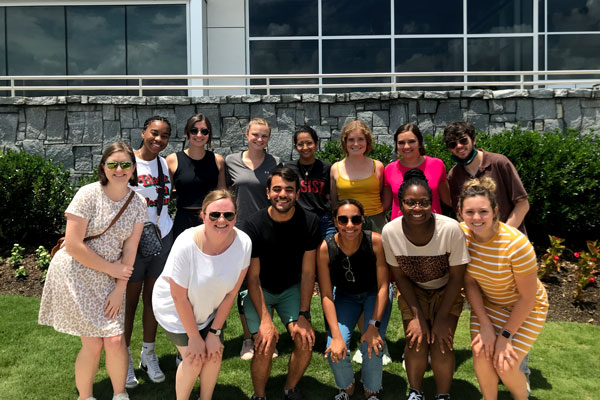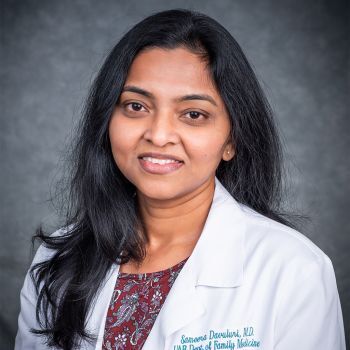CU2RE Students Visit Montgomery Museums to Reflect on the Past and Work Toward a More Equitable Future in Medicine
 The National Memorial for Peace and Justice honors victims of lynching and racial terror. (Photo: Flickr Creative Commons)
The National Memorial for Peace and Justice honors victims of lynching and racial terror. (Photo: Flickr Creative Commons)
On a July morning that was already beginning to swelter, students, faculty and staff in the Department of Family Medicine’s Comprehensive Urban Underserved and Rural Experience, or CU2RE, program loaded onto a bus to make the hour-and-a-half trip from Birmingham to Montgomery.
On their itinerary that day were three museums and memorials: The National Memorial for Peace and Justice, The Legacy Museum and the Mothers of Gynecology Monument. Each of these sites sheds light on both the brutality of racism in the United States and the resilience of African Americans in this country. For medical students hoping to build their careers around providing primary care in underserved communities, these museums also hold important lessons about the cultural consciousness of racism in medicine and the socioeconomic barriers patients might face.
CU2RE student Amiria Blakely described it as a “journey of learning more about some of the heartbreaking and eye-opening truths of American history.”
“We will be able to use this knowledge to improve the care and treatment of those who have been consistently marginalized in medicine,” Blakely said. “As students and future physicians, being pre-exposed to all these topics allows us the opportunity to better manage situations when they arise and use our experience to assist our peers.”
 CU2RE students with Urban Underserved and Rural Pathways Director Jill Marsh, M.D., outside of the memorial.
CU2RE students with Urban Underserved and Rural Pathways Director Jill Marsh, M.D., outside of the memorial.
The Montgomery excursion was part of the CU2RE summer program, an eight-week program providing the 14 students in CU2RE's second cohort – rising second-year medical students across UAB’s four campuses – with a variety of in-person and virtual programming. In addition to visiting the museums in Montgomery, students engaged with the Race, Racism and Racialized medicine module and facilitated session and took part in a Birmingham landmarks tour with Shyla K. Fields, MBA, director of the department’s Office of Identity, Inclusion and Collective Conscience, focusing on cultural competency and understanding barriers to care. They also participated in workshops focused on leadership and interprofessional education, and in skills workshops and clinical experiences. You can read more about the full summer program here. The CU2RE program is now accepting applications from first-medical students. Interested students can learn more here.
In Montgomery, the day started with The National Memorial for Peace and Justice, a six-acre site created by the Equal Justice Initiative to memorialize thousands of known and unknown victims of lynching in the American South. Eight hundred six-foot metal monuments, inscribed with the names of known lynching victims in counties across the south, stand on a hillside or drop down from the memorial’s ceiling as visitors walk through, creating an immersive experience that uses art to visually move from the arrival of enslaved men and women in the U.S. to racial terror in the Jim Crow South to the Civil Rights Movement and ongoing fights for equality and justice today.
Just down the street from the memorial is the Mothers of Gynecology Monument. Created by founder and artist Michelle Browder, the monument honors three African American women, Anarcha, Lucy and Betsy, who were enslaved and subjected to medical experimentation without anesthesia by Montgomery doctor J. Marion Sims. Though Sims became known worldwide as the “father of gynecology,” the pain and suffering of the women who helped bring about his advances were less well-known. Browder works to celebrate those women and share their stories, especially with future medical practitioners like the CU2RE students. The monument includes three beautiful, larger-than-life sculptures of Anarcha, Lucy and Betsy that Browder created, each component carefully chosen for its symbolism and meaning. There is a surrounding garden with art exhibits and historical information, and Browder recently bought the nearby building that Sims used as a hospital, which she plans to turn into both a museum and an upstairs clinical space that can provide health care and education to the community.
 These sculptures by Michelle Browder honor three enslaved women, Anarcha, Lucy and Betsy, who endured medical experimentation, often without anesthesia.
These sculptures by Michelle Browder honor three enslaved women, Anarcha, Lucy and Betsy, who endured medical experimentation, often without anesthesia.
The CU2RE group ended the day at The Legacy Museum, which was also created by the Equal Justice Initiative and pairs with The National Memorial for Peace and Justice. The museum takes visitors chronologically from the beginning of slavery in America, including enslaved Africans’ harrowing journey across the Atlantic Ocean, through the Civil War, the abolition of slavery, the rise of Jim Crow and segregation, lynching and racial terror, the Civil Rights Movement and modern-day mass incarceration disproportionately affecting African Americans. The exhibits are thorough and immersive, from the virtual waves of the Atlantic Ocean that crash and tower above you in the first room to the phone booths in one of the final rooms, where you can pick up the phone and watch and listen as someone tells his or her story from prison.
As communications director, I joined the students for all three museums to get a sense of what they were experiencing and to learn from the exhibits and discussions. Like many of the CU2RE students, I grew up in Alabama. I was familiar with some of the history that the museums shared, such as the history of slavery and Civil Rights Movement, but completely unaware of other topics, such as the gynecological experiments Lucy, Anarcha and Betsy endured or the circumstances and atmosphere of racial terror created by the many lynchings across Alabama. I was most struck by the continued legacy of that violence and how it informs many of the problems we face today. I left further convinced of the importance of talking about this history and these problems openly and honestly so that we can take them on together as a department, a school and a community.
After visiting The Legacy Museum, we all boarded the bus bound for Birmingham, but the discussion didn't end there. The following day, Alluvial Collective led reflective sessions for youth, citizens, and communities. The week concluded with a reflection session between Cary Foutain, co-founder of The Black Cherry Tree Project, and Fields. Students viewed art and poetry memorializing 17 of 33 victims of lynching and racial terror in Jefferson County. A facilitated discussion followed on how the juxtaposition of art and medicine can shed light on and heal today's people through storytelling, intentionality, and caring for them as whole humans.
Students will continue to focus on disparities in medicine and social determinants of health throughout their time in the CU2RE program, with the ultimate goal of better understanding and meeting the needs of the communities where they will serve and creating medical practices that serve all patients well.
Expanding CU2RE Summer Program Supports UAB Medical Students
 Jill Marsh, M.D., and CU2RE summer program students during their Montgomery, Ala. trip.This summer, 14 medical students from UAB Heersink School of Medicine’s four regional campuses share at least two characteristics: all are interested in primary care and all want to learn how to care for underserved communities. They comprise the second cohort of the Comprehensive Urban Underserved and Rural Experience (CU2RE) program in UAB's Department of Family and Community Medicine.
Jill Marsh, M.D., and CU2RE summer program students during their Montgomery, Ala. trip.This summer, 14 medical students from UAB Heersink School of Medicine’s four regional campuses share at least two characteristics: all are interested in primary care and all want to learn how to care for underserved communities. They comprise the second cohort of the Comprehensive Urban Underserved and Rural Experience (CU2RE) program in UAB's Department of Family and Community Medicine.
Some of Our Favorite Photos from The World Games 2022
Over the past 10 days, Birmingham became a hub for sports of all kinds as athletes from around the world descended and delighted fans with everything from canoe water polo to softball, lacrosse to parkour. It was a fun few weeks for sports fans in our city and an exciting time for our Sports and Exercise Medicine and Family Medicine teams as UAB served as the official medical provider.
Read moreWith World Games, UAB Continues Its Support of Elite Wheelchair Rugby Teams
 Low point wheelchair rugby is coming to The World Games in Birmingham. (Photo by Lexi Coon)
Low point wheelchair rugby is coming to The World Games in Birmingham. (Photo by Lexi Coon)
As The World Games get underway in Birmingham on July 7, UAB Sports and Exercise Medicine providers are slated to care for, among many others, athletes competing in the wheelchair rugby tournament.
Read moreTaking Care of Your Cognition and More: A Brain Health Q&A with Davuluri
 Sameera Davuluri, M.D.According to Alzheimer’s Disease International, dementia starts to appear in 10 million people every year, and the number of people with dementia is only expected to increase. However, there are ways to improve brain health and prevent at least some of the complications that come with aging, dementia and similar conditions. As June, National Alzheimer’s and Brain Awareness Month, concludes, Sameera Davuluri, M.D., assistant professor in the Department of Family and Community Medicine and medical director of the family medicine clinic at UAB Hoover Primary Care, answers four questions about lifestyle changes that can improve brain health.
Sameera Davuluri, M.D.According to Alzheimer’s Disease International, dementia starts to appear in 10 million people every year, and the number of people with dementia is only expected to increase. However, there are ways to improve brain health and prevent at least some of the complications that come with aging, dementia and similar conditions. As June, National Alzheimer’s and Brain Awareness Month, concludes, Sameera Davuluri, M.D., assistant professor in the Department of Family and Community Medicine and medical director of the family medicine clinic at UAB Hoover Primary Care, answers four questions about lifestyle changes that can improve brain health.
Ask a Primary Care Provider: June Recap
 This June, we are recapping all the health-related advice our UAB Department of Family and Community Medicine providers have given us through our Ask a Provider social media series. Keep reading for trustworthy guidance on the importance of bedtime, questionable moles and a good warmup and cooldown routine for exercising.
This June, we are recapping all the health-related advice our UAB Department of Family and Community Medicine providers have given us through our Ask a Provider social media series. Keep reading for trustworthy guidance on the importance of bedtime, questionable moles and a good warmup and cooldown routine for exercising.
Faircloth Wins Award From National Organization
 Michael Faircloth, M.D., associate professor in the UAB Department of Family and Community Medicine, won the American College Health Association (ACHA) Edward Hitchcock Award for Outstanding Contributions in College Health. According to AHCA, members who have sought to improve college student healthcare everywhere by completing exceptional work are highlighted with this 61-year-old, national award.
Michael Faircloth, M.D., associate professor in the UAB Department of Family and Community Medicine, won the American College Health Association (ACHA) Edward Hitchcock Award for Outstanding Contributions in College Health. According to AHCA, members who have sought to improve college student healthcare everywhere by completing exceptional work are highlighted with this 61-year-old, national award.
How Our Families Get Active: Celebrating Family Health and Fitness Day
Saturday, June 11, marked National Family Health and Fitness Day. This day encourages families to take care of their health, be active and enjoy time together.
To celebrate, here are some pictures of the UAB Department of Family and Community Medicine faculty and staff spending time with their families, getting outside and getting active.
Read moreAsk a Primary Care Provider: May Recap

This May, the UAB Department of Family and Community Medicine’s social media posted advice, summarized below, from department providers on how to handle stress, anxiety and picky eaters.
Read moreCahaba Medical Care, UAB Family and Community Medicine Launch New Residency Track at Highlands Through HRSA Grant
The Health Resources and Services Administration (HRSA) has awarded Cahaba Medical Care and the University of Alabama at Birmingham Department of Family and Community Medicine a grant in the amount of $640,000 to create a new Family Residency Program at UAB Hospital-Highlands. This grant will expand the existing partnership between UAB and Cahaba Medical Care. Combined, the Cahaba-UAB Family Medicine Residency program is now a 20-20-20 Graduate Medical Educational Program with four “campuses” or “tracks.”
Read moreThe Class of 2022 is Committed to Family Medicine, with the Largest Total Share of Residency Matches
Future family medicine physicians make up the largest chunk of the UAB Marnix E. Heersink School of Medicine 2022 graduating class, with 23 physicians matched into family medicine residencies.
Read moreNew CU2RE Pipeline Program Welcomes 12 Undergraduate Students Aiming for Medical School
The Comprehensive Urban Underserved and Rural Experience (CU2RE) program is opening a new component to its mission—the CU2RE Primary Care Pipeline Program.
Read moreCongratulations to Our Patient Experience Heroes!

Sumayah Abed, M.D., assistant professor and practitioner at the Hoover Family Medicine clinic, Felicia Boyd, R.N., nurse manager at the Highlands Family Medicine clinic, and Annie Shedlarski, R.N., nurse manager at the Hoover Family Medicine clinic, were recently named UAB Patient Experience Heroes.
Read moreAsk A Primary Care Provider: April Recap

Family medicine physicians in the UAB Department of Family and Community Medicine are answering some frequently asked questions about common health concerns on social media.
Read moreSumayah Abed, M.D., Reflects on Arab American Heritage Month in Medicine
April is Arab American Heritage Month, a time to celebrate the many contributions Arab Americans have made to U.S. history and culture and to learn more about Arab American heritage. For Sumayah Abed, M.D., assistant professor in UAB’s Department of Family and Community Medicine, the month offers an occasion to reflect on her own journey and on the contributions Arab Americans have made to medicine.
Read moreProviders Reflect After the 2022 American Medical Society for Sports Medicine Conference
Department leadership, sports medicine faculty and fellows attended the American Medical Society for Sports Medicine’s (AMSSM) annual conference in Austin, Texas this month. Department team members contributed research poster presentations, podium presentations, conference lectures and roundtables throughout the five-day event.
Read moreTeam Members Recognized with Excellence Awards
March was a month of awards as two Department of Family Medicine staff members were honored with UAB awards and Chinavia Prad, CMA, certified medical assistant lead at Hoover Primary Care, received a 2022 Ambulatory Clinical Nurse Excellence Award.
Read moreNew FMIG Student Leadership Team Announced
Written by: Kenia Hernandez
The Family Medicine Interest Group (FMIG) is a student-led organization that empowers medical students on campus to learn more about the family medicine specialty. FMIG is sponsored by the Department of Family and Community Medicine and funded by the Alabama Academy of Family Physicians Foundation and the Alabama Rural Health Board.
Read moreMehta Joins Department as Inaugural Vice Chair for Research
Tapan Mehta, Ph.D., M.S., is joining the Department of Family and Community Medicine as the department’s inaugural vice chair for research. He will also serve as a full professor for the department. Mehta started his research career as a graduate research assistant at UAB nearly 20 years ago and has served in various positions within UAB ever since. He started his new role with the department on April 1, 2022.
Read moreTreating Patients with Long-Lasting “Post-COVID” Symptoms
For some patients, long after the acute symptoms of a COVID-19 infection fade, lingering symptoms remain and can alter their day-to-day quality of life.
Read more